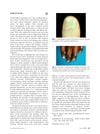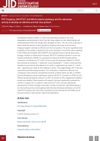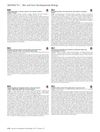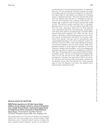3 citations,
August 2021 in “Veterinary dermatology” New treatments for hair loss are emerging as we better understand hair growth and its genetic causes.
 2 citations,
June 2018 in “Journal of the American Academy of Dermatology”
2 citations,
June 2018 in “Journal of the American Academy of Dermatology” Alopecia areata causes varying hair loss and nail changes, and treatments include topical, systemic, and injectable therapies.
 1 citations,
May 2023 in “Prospects in Pharmaceutical Sciences”
1 citations,
May 2023 in “Prospects in Pharmaceutical Sciences” New cytokine-targeted therapies show promise for treating alopecia areata.
 1 citations,
January 2020 in “Surgical & Cosmetic Dermatology”
1 citations,
January 2020 in “Surgical & Cosmetic Dermatology” Combining oral minoxidil with JAK inhibitors helps regrow hair in severe alopecia areata cases.
 1 citations,
April 2017 in “Journal of Investigative Dermatology”
1 citations,
April 2017 in “Journal of Investigative Dermatology” Tofacitinib may slow hair loss in scarring alopecias but is unlikely to regrow significant hair.

Baricitinib may effectively treat oral lichen planus.
 January 2024 in “Journal of Crohn's and colitis”
January 2024 in “Journal of Crohn's and colitis” Janus Kinase inhibitors are effective and have an acceptable safety profile for treating moderate to severe Ulcerative Colitis.
 December 2023 in “JEADV Clinical Practice”
December 2023 in “JEADV Clinical Practice” A woman's hair grew back with baricitinib treatment, but she developed a temporary hairy tongue that was treated with regular tongue brushing.
 November 2022 in “Journal of Investigative Dermatology”
November 2022 in “Journal of Investigative Dermatology” The lotion with specific plant extracts effectively increased hair growth and improved hair cycle in subjects after 3 months.

Hair loss can be caused by hormones, illness, autoimmune disorders, or vitamin deficiencies, and treatments vary depending on the type.
 August 2022 in “Revista de la Universidad Industrial de Santander/Salud UIS”
August 2022 in “Revista de la Universidad Industrial de Santander/Salud UIS” Stress-related hair loss was reversed with a special medication.
 April 2019 in “The journal of investigative dermatology/Journal of investigative dermatology”
April 2019 in “The journal of investigative dermatology/Journal of investigative dermatology” Machine learning can predict how well patients with alopecia areata will respond to certain treatments.
 April 2017 in “Journal of Investigative Dermatology”
April 2017 in “Journal of Investigative Dermatology” Blocking JAK-STAT5 signaling in mice leads to hair growth.
 April 2016 in “Journal of the American Academy of Dermatology”
April 2016 in “Journal of the American Academy of Dermatology” Tofacitinib helped a person with total body hair loss grow hair again without bad side effects.
 April 2016 in “Journal of Investigative Dermatology”
April 2016 in “Journal of Investigative Dermatology” Blocking Oncostatin M's role in the JAK-STAT pathway can stimulate hair growth in mice.
 November 2023 in “Journal of Investigative Dermatology”
November 2023 in “Journal of Investigative Dermatology” JAK inhibitors partially restore scalp bacteria balance in alopecia areata patients.
 September 2023 in “Journal of the American Academy of Dermatology”
September 2023 in “Journal of the American Academy of Dermatology” Topical tofacitinib helped a man with severe scalp condition after other treatments failed.
 June 2023 in “British journal of dermatology/British journal of dermatology, Supplement”
June 2023 in “British journal of dermatology/British journal of dermatology, Supplement” Patients with alopecia areata face challenges accessing Janus kinase inhibitors, but some see positive results.
April 2016 in “The journal of investigative dermatology/Journal of investigative dermatology” The ALADIN score can predict how well patients with alopecia areata will respond to JAK inhibitor treatments.
 January 2022 in “Clinical Cases in Dermatology”
January 2022 in “Clinical Cases in Dermatology” Androgenetic alopecia, a common hair loss condition, can be treated with topical minoxidil, oral finasteride, or oral spironolactone, and new treatments like platelet-rich plasma, low-level laser therapy, and janus-kinase inhibitors are being explored.
 222 citations,
September 2016 in “JCI insight”
222 citations,
September 2016 in “JCI insight” Tofacitinib is safe and effective for severe alopecia areata, but hair loss may return 2 months after stopping treatment.
52 citations,
September 2014 in “Nature medicine” JAK inhibitors might help treat alopecia areata.
 32 citations,
April 2019 in “JAAD case reports”
32 citations,
April 2019 in “JAAD case reports” JAK inhibitors helped treat hair loss in two people with Down syndrome.
21 citations,
November 2015 in “The journal of investigative dermatology. Symposium proceedings/The Journal of investigative dermatology symposium proceedings” There is no cure for alopecia areata, but treatments like JAK inhibitors show promise.
 7 citations,
August 2023 in “Journal of the American Academy of Dermatology”
7 citations,
August 2023 in “Journal of the American Academy of Dermatology” JAK inhibitors offer new hope for treating severe alopecia areata.
 1 citations,
December 2017 in “The journal of investigative dermatology. Symposium proceedings/The Journal of investigative dermatology symposium proceedings”
1 citations,
December 2017 in “The journal of investigative dermatology. Symposium proceedings/The Journal of investigative dermatology symposium proceedings” Treating alopecia areata is difficult due to limited approved treatments, but new therapies like JAK inhibitors show promise.
1 citations,
November 2016 in “Saengmyeong gwahag hoeji/Saengmyeong gwahak hoeji” New treatments for the autoimmune hair loss condition alopecia areata may include JAK inhibitors and other immunomodulators.
 July 2023 in “The Egyptian Journal of Hospital Medicine ”
July 2023 in “The Egyptian Journal of Hospital Medicine ” Alopecia areata is a hair loss condition caused by immune factors and can be treated with JAK inhibitors.
 April 2023 in “Revista colombiana de reumatología”
April 2023 in “Revista colombiana de reumatología” JAK inhibitors like tofacitinib can effectively treat severe alopecia areata.
December 2017 in “Actas dermo-sifiliográficas/Actas dermo-sifiliográficas” JAK inhibitors show promise for treating Alopecia Areata, while statins are not recommended.























